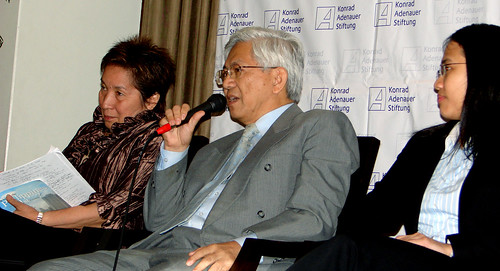Whither the Philippines in the 21st Century? - Foundation Office Philippines
Book presentation
Details
---
The Konrad-Adenauer-Stiftung (KAS) together with the Institute of Southeast Asian Studies (ISEAS), Singapore converged for the awaited book launch of “Whither the Philippines in the 21st Century?” at the Intercontinental Hotel Manila on April 22.
The book was the result of a conference of the same title organized by ISEAS in July 2006 in Singapore, which was then attended by an impressive crowd of scholars and observers in order to make an assessment about the Philippines. Key experts from different sectors, such as Amb. Rodolfo Severino and Ms. Lorraine Salazar from ISEAS, Dr. Carolina Hernandez from the Institute for Strategic and Development Studies (ISDS), Dr. Gerardo Sicat from the University of the Philippines (UP), Mr. Peter Wallace from the Wallace Business Forum, Dr. Jose Abueva from Kalayaan College, Dr. Arsenio Balisacan, and more, are all contributors to the book.
Mr. Klaus Preschle, who opened the launch, expressed his warm support for the project towards “solving the Philippine Puzzle”, citing the contributions of the book as a source of data analysis and insight into Philippine politics and development.

Dr. Solita Monsod, professor of economics from the University of the Philippines, gave a review of the book, as well as the keynote speech for the event. Acknowledging the Philippines as a conundrum and a paradox, she identified the country’s insoluble problem to be its low performance and slow poverty reduction. Dr. Monsod also pointed out the general agreement of the book’s contributors on these woes as, “symptomatic of weak governance and institutions within a political system dominated by elite and political clans, the so-called cacique democracy and exacerbated by high population growth.”
Yet, one important point that Dr. Monsod cited was that in relation to the gravity of the problem, the authors have divergent views. In spite of this, she gave credit to the overall discussions as most stimulating.
Moreover, she emphasized the book’s value-added as its ability to provide the readers with broader perspectives given its wide range of opinions.
Despite this, like every good review, Dr. Monsod pinpointed some of the books gaps such as the failure to feature the judiciary system and events having the tendency to overtake the opinions of the writers.
Nevertheless, according to her, given the Philippines’ limited access order set to mature, “There is still hope.”
Dr. Lorraine Salazar, one of the book’s editors, gave an overview and the context of the book project and cited the current challenges plaguing the country, such as having one of the highest unemployment rates in Asia, one of the highest poverty rates in Southeast Asia and the prevailing skepticism on our economic development despite an admirable 7.3 % growth rate.
She then went to give an overview of each of the book’s chapters as well as their corresponding authors and grouping. Salazar outlined the grouping citing Chapters 1 to 3 as covering the country’s political issues; 7 to 11 focusing on economic issues and 12 – 13 exploring the two longest running insurgencies in the country. The last chapter is dedicated for the synthesis and conclusion.
Dr. Salazar enumerated their vision on how the book could contribute in three ways: (1) to help contribute and influence the ongoing policy debates in the country. (2) to provide and introduction to issues at hand to an international audience and (3) to constitute a resource on key issues and topics to anyone interested in understanding the Philippines beyond the headlines of the newspapers.
Ambassador Rodolfo Severino, Head of the ASEAN Studies Center of ISEAS provided the synthesis of the book highlighting the country’s problems of slow poverty reduction, and the trend of Filipinos leaving the country to seek for opportunities abroad attributing this to lack of local opportunities here.
With these, Severino outlined the following suggestions to address the nation’s problems: (1) greater attention to the development of rural areas where most Filipinos still reside; (2) management of population growth; (3) call for greater investment in public health and education and (4) significant reduction in the level of corruption in multi-government and private sectors.
Hence realizing the nature of the problem as grounded on distribution not only of wealth but of political power; Severino called for the freedom of votes and an effective leadership with the electorate possessing the real choice for such.
The launch was graced by some of the book’s contributors and other notable personalities from the academe, media, political and social landscapes including members of the international community and partners.


